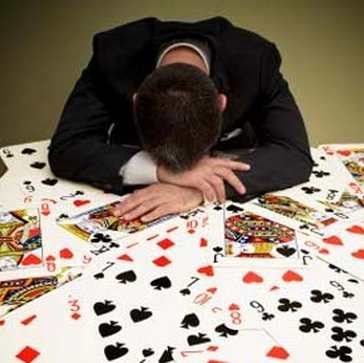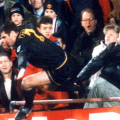Addiction In Football: The PFA Needs To Take A Stand Now
Addiction in football is not a new issue and indeed there is a long, sorry history of the destructive power that it has wreaked...

We live in addicted and addictive times. Hardly a day goes by without revelations of another public figure falling prey to one demon or another, be it alcohol, drugs, sex, gambling and sometimes all four together. Sportspeople rub shoulders in the gutter (press) with singers, actors, public figures of all shapes and sizes. The modern obsession with celebrity merely exacerbates the problems and in many cases is one of the principal sources of those very problems.
Footballers seem to be especially prone to the dangers of addiction, this September alone we have had a series of revelations. The ex-England international Kenny Sansom talked about how his struggle with alcoholism and gambling had ended up with him sleeping rough in a churchyard. The latest Gazza documentary on ITV was harrowing, reducing Ian Holloway to floods of tears in the process and as a result he described football as having “become a monster”. The documentary brutally exposed how Gascoigne’s generally kind nature has been ruined by his (losing) battle with alcoholism. Keith Gillespie’s forthcoming book, “How Not to be a Football Millionaire” delves into how he blew £7 million on gambling. The much-travelled and much-respected Kevin Davies meanwhile has revealed how he knew of a player who had to hide away in the loo during half-time of a match just to check how the horse on which he had bet £20,000 had fared. Addiction is pervasive and its tentacles seem to be stretching ever more powerfully across the world of football in particular.
Addiction in football is not a new issue and indeed there is a sorry, lengthy history of the destructive power that it has wreaked on players and managers going back many decades. The tormented tales of addiction in British football are legion, from Greaves to Gascoigne, Best to Barton, providing constant cannon fodder for the tabloid press. Back in the 1970s and 1980s there was a tacit acceptance of drinking as part and parcel of the job, and even a hint of glorification. In many ways it added glamour and attractiveness. Charlie Nicholas was known as “Champagne Charlie” for his lavish London lifestyle, George Best was the “Fifth Beatle” and in his frequent bust-ups with the stern disciplines of Matt Busby, Best was considered the victim, after all, it was argued he was just having fun. The acceptance of, and delight in, this laddish culture is epitomised in Best’s throw-away line “I spent a lot of money on booze, birds and fast cars. The rest I squandered.”
More…
Best did not receive any treatment during his career and neither did his peers because there was no understanding that this was a problem. Such addiction was not only accepted, it was encouraged and positively lauded in many circles. Into the 1990s lurid headlines abounded and sympathy began to run out as the players started to earn huge salaries and the ethos of the overpaid and over-pampered prima donnas was born. Whilst at the same time there was a broader recognition of the problems associated with these often self-destructive compulsive behaviours, there was still a commonly held belief that this was par for the course and an inevitable consequence of playing football. In a candid interview with Lars Siversten in “The Blizzard”, Claus Lundekvam told of his amazement at the situation he faced as a young Scandinavian arriving at Southampton (not exactly the bright lights that Nicholas and Best ‘enjoyed’) where it was de rigueur to get involved in drinking sessions and non-participation was treated with barely-concealed contempt. Like so many others, Lundekvam became addicted and when his career was cut short by injury, he faced massive problems trying to overcome a dependency upon drinks and drugs after returning to his native Norway, permanently tarnished by his spell in English football.
Whilst in 2000 Lundekvam’s career was on the rise another strong, uncompromising centre back who suffered from addiction, the former Arsenal captain, Tony Adams set up the Sporting Chance Clinic. Adams had been plagued by alcoholism throughout his illustrious career but, unlike many others, he did not turn a blind eye and decided to tackle the problem of addiction head on by establishing ‘a safe, dedicated environment, where sportsmen and women could receive support and counselling’. In offering specialised residential courses over 26 days, Sporting Chance has developed over the last 13 years into one of the world’s leading programmes for the treatment of addicted sportspeople. But Sporting Chance can only treat four people at one time, so around 50 people a year from all sports. Conservative estimates suggest that there may be as many as 500 footballers suffering from one type of addiction at any one time, so Sporting Chance’s laudable aim is merely scratching at the surface.
Tragically, earlier this month, Peter Kay the man who helped set up Sporting Chance with Adams, died at the age of 52. His untimely death coincided with the publication of the bitter experiences of Gillespie, Sansom et al. The fact that here was a catalogue of people who would have benefited from his pioneering work is a bitter twist in the recent history of addiction. The number of footballers still suffering from these problems is mounting but what has changed massively in the last ten years is that alcohol consumption amongst footballers has been gradually reduced as the increasing European influence on healthy living and body conditioning beds into professional clubs. But, as addiction to alcohol has fallen, the rise of gambling, especially through the internet, has now taken over as the leading addiction for sportspeople – almost 2/3rds of Sporting Chance admissions are now gambling-related. As betting does not affect the physical health of the players in the same ostensible way that drinking and drug-taking might, so the habit can be buried away, ultimately causing even more damage.
Football has cut many of its ties with alcohol, limiting drinking in grounds and club sponsorship, but at the same time gambling has become more and more integrated into the fabric of football. The vast majority of professional clubs have sponsorship/ naming rights with betting companies. All 20 Premier League clubs have some commercial partnership with a gambling firm and The Football League’s current sponsor is none other than SkyBet. There is never an advertisement break during televised matches, which does not feature an enticement to bet especially in-play, so gambling has quickly become a fundamental financial cornerstone of the football industry.
More…
Don’t Call Addicts Junkies, Just Be Grateful It Isn’t You
Football Manager: My Love Affair With Gaming’s Addictive Beast
This puts the authorities in a tight corner as they can hardly turn away one of the principal sources of finance for the game. But the Professional Footballers Association is in the most invidious position of all. As the guardians of professional players, the PFA have made strong and unequivocal statements on the problems. Gordon Taylor, PFA chief executive, declared earlier in the year that “gambling is possibly the biggest danger facing our members.” Taylor was responding to high profile cases such as Andros Townsend, recently capped by England, being fined £18,000 by the FA for breaching betting regulations.
It is essential that the PFA takes such a strong stand against the evils of addiction but there is a deep irony lurking at the very top of the organisation. The outgoing chairman, Clarke Carlisle has revealed in his recently-released autobiography that he suffered a bout of alcoholism which led him to contemplate suicide in 2003 and his battle has continued since. But with a keen sense of schadenfraude, there were staggering allegations made by The Sun newspaper that Gordon Taylor himself had placed 2,000 bets amounting to a scarcely credible £4 million in just 30 months. Taylor kept his £1 million p.a. job as one of the highest paid Trade Union leaders, which was a surprise to many. Those allegations were not refuted and Taylor’s retention could perhaps be justified by the view that having been there and got the betting slip he could offer help and guidance. But considering that the PCA, which is an infinitely smaller organisation serving cricket (a sport that has a fraction of the wealth and resources of football) has developed a much more robust and dedicated approach with a well-established support programme, started in 2002, puts football’s efforts into perspective. Based on an Australian model, the PCA’s Performance Lifestyle Team is a group of fully trained counsellors who travel the country constantly talking to players about the dangers of what Jason Ratcliffe, Deputy Chief Executive of PCA, calls living in “the cricket cocoon”. The fact that the PCA have had a confidential Helpline and support network since 2007 and the PFA are still in discussions about it, says it all.
If you like it, Pass it on
 COMMENTS
COMMENTS
There's a good argument for adapting the American football style system in which players have to finish college before they become pros. Lets be honest they don't know much else but football and go from hanging out on the street corners to........the same but with loadsa money.
This is one of the best things I've read on Sabotage times. Great article.
I am involved with subject of gambling through a work study and was fascinated by this article by Richard Foster - it was informative on an addiction I had not worked with.
Great article Richard
Well written and considered article on a difficult and oft-ignored subject. Footballers earn a lot of money, are young and generally uneducated so they are likely to have demons. Why don't we get more writing like this?
Nice work, Richard. There's surely a book in this....
A real thought-provoking piece. Nice one.
A fascinating read from a now less than keen gambler. I suspect this is a lot less rife in today's game amongst the top professionals, but Taylor's exploits can't be forgotten about that easily, surely?


 RELATED
RELATED









 SABOTAGE
SABOTAGE





